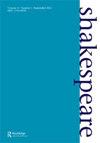“除了面具,面具还能做什么?”:莎士比亚喜剧中的面具女郎
IF 0.2
3区 文学
0 LITERATURE, BRITISH ISLES
引用次数: 0
摘要
摘要现代早期作为时尚配饰佩戴的黑色维扎德面具引起了人们的复杂焦虑:虽然许多女性都戴着口罩,但它们与性工作者有关。巫师保存了苍白的美丽,但也掩盖了它的不足。这篇文章提出,威廉·莎士比亚的喜剧利用了这些紧张关系,首先提出舞台上确实戴着时髦的维扎德面具。然后,我以《爱的劳动》的《迷失》和《无事生非》作为关键案例研究,认为这些服装面具承载着台下卖淫和布匹种族假肢的舞台历史,具有特定的符号意义,使剧作家能够成为反思当代对女性白人、性可用性、,从一个女人的脸上不可能了解她的内心。本文章由计算机程序翻译,如有差异,请以英文原文为准。
‘What els do Maskes, but Maskers Show’: Masked Ladies in Shakespeare’s Comedies
ABSTRACT Black vizard masks, worn as a fashion accessory in the early modern period, were a source of mixed anxieties: while they were worn by many women, they were associated with sex workers. Vizards preserved pale beauty but also could conceal the lack thereof. This essay proposes that William Shakespeare’s comedies tap into these tensions, first by proposing that fashionable vizard masks were indeed worn onstage. Using Love’s Labour’s Lost and Much Ado About Nothing as key case studies, I then argue that these costume masks, weighted with the baggage of both offstage prostitution and the stage history of cloth racial prosthetics, carried specific semiotic meaning, allowing playwrights a shorthand for reflecting on contemporary fears regarding women’s whiteness, sexual availability, and the impossibility of ever knowing a woman’s heart by looking at her face.
求助全文
通过发布文献求助,成功后即可免费获取论文全文。
去求助
来源期刊

Shakespeare
Multiple-
CiteScore
0.30
自引率
33.30%
发文量
37
期刊介绍:
Shakespeare is a major peer-reviewed journal, publishing articles drawn from the best of current international scholarship on the most recent developments in Shakespearean criticism. Its principal aim is to bridge the gap between the disciplines of Shakespeare in Performance Studies and Shakespeare in English Literature and Language. The journal builds on the existing aim of the British Shakespeare Association, to exploit the synergies between academics and performers of Shakespeare.
 求助内容:
求助内容: 应助结果提醒方式:
应助结果提醒方式:


